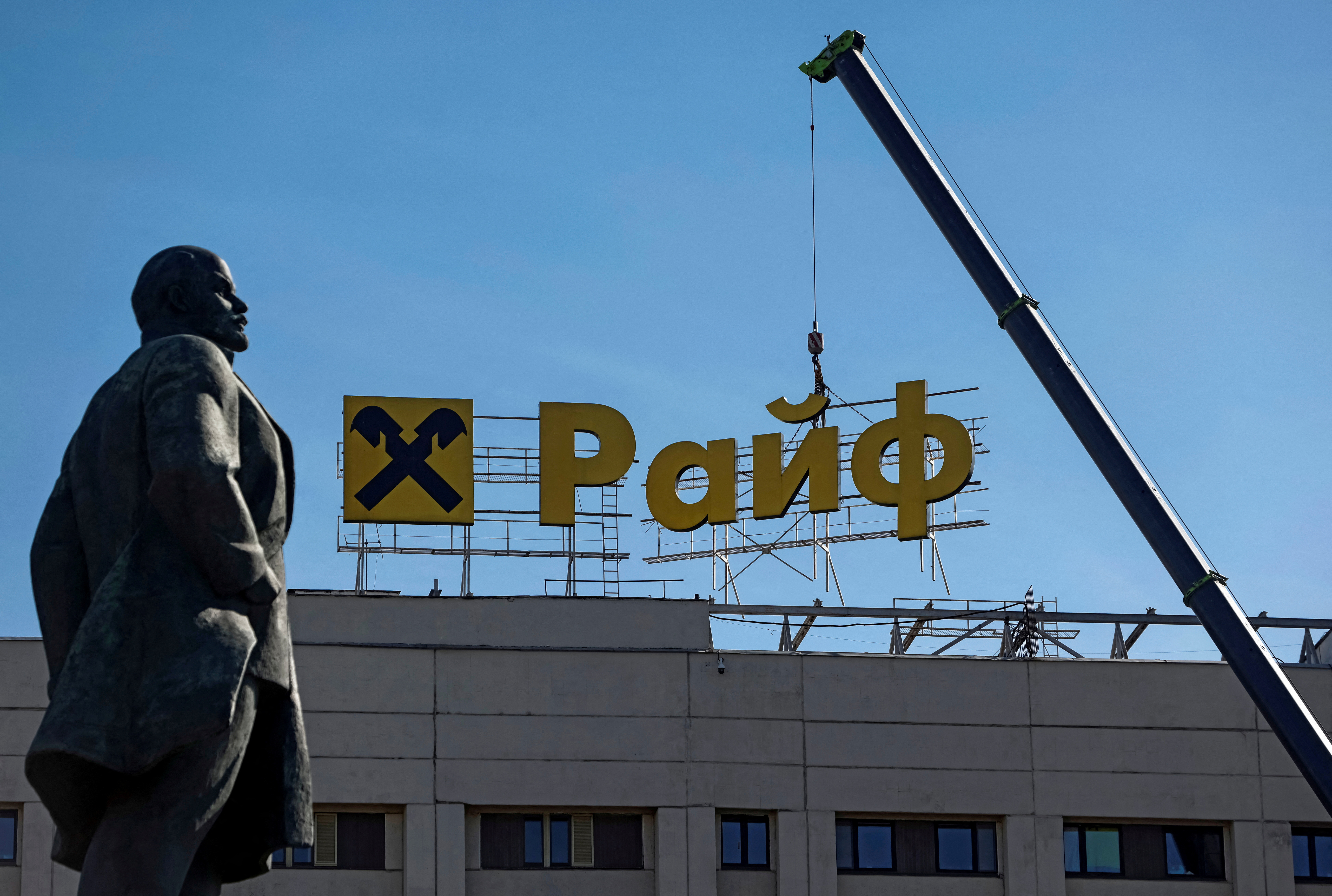
Exclusive-Austrian officials warn Raiffeisen off Russian oligarch deal, sources say

By Francesco Canepa and John O’Donnell
LONDON (Reuters) -Austrian authorities have urged Raiffeisen Bank International (RBI) to drop a deal linked to a Russian oligarch fearing a backlash from the United States, people familiar with the matter said, a blow to RBI’s plans to unlock funds stranded in Russia.
RBI, the biggest Western bank in Russia, wants to buy a stake in construction group Strabag linked to Oleg Deripaska for 1.5 billion euros ($1.6 billion), a contested deal that has renewed international pressure on the Austrian lender.
In recent weeks, Austrian central bank officials have warned RBI about the deal, cautioning it could backfire if the U.S. penalises the bank, said one person with direct knowledge of those discussions.
The central bank is responsible for oversight of Western sanctions in Austria and also watches for broader financial stability.
Shares in RBI fell nearly 4% after the Reuters report, closing at 17.38 euros, against a 0.3% drop across the European banking sector.
RBI is buying the stake in Vienna-based Strabag from a company the construction group identified as earlier controlled by Oleg Deripaska.
The move had come under fire from the U.S. Treasury because Deripaska is sanctioned, exacerbating tensions between Washington and RBI, which is already under scrutiny from U.S. sanctions enforcement agency OFAC.
Other Austrian public officials have also privately cautioned the bank against the sale, believing it could be declared a breach of sanctions, said two people with direct knowledge of those discussions.
One of those people said RBI had been warned by U.S. authorities that they could not give their blessing for the deal and could impose a penalty if it pressed ahead.
Although it is unclear what that penalty might be, U.S. authorities have the power to fine or even take the drastic step of shutting a bank out of dollar payments.
The sale is embarrassing for Austria, given international criticism of the country for being too friendly towards Russia, one of the people with direct knowledge of officials’ thinking told Reuters.
A spokesperson for RBI said the “acquisition of Strabag shares remains subject to the compliance review of RBI”, adding that it “will not buy the shares from Mr. Deripaska nor any other sanctioned person or entity”.
A central bank spokesperson declined to comment.
A spokesperson for Deripaska said he had “had nothing to do with Strabag for a long time” and would not comment, describing Western sanctions against him as “totally misguided” and “based on false information”.
RUSSIA BOND
Two years after Russia’s full-scale invasion of Ukraine, RBI’s continued presence in Russia underlines the ties between Moscow and Vienna – whether via Russian gas pipelines or Vienna serving as a hub for cash from Russia and former Soviet states.
RBI’s Russia business is a money spinner but has tarnished the group’s image. Investors welcomed the prospect of the Strabag deal but the bank was forced to drop a planned bond sale when the U.S. objections emerged in a Reuters report.
The change of tone in Vienna, where officials and ministers have so far sought to stymie international pressure on RBI, is a rare challenge at home to the bank that is part of an industrial group underpinning Austria with wide political influence.
RBI has resisted pressure to cut ties with Moscow, although it says it has long explored doing so.
Strabag is one of Europe’s biggest construction firms and built the Olympic stadium for the Sochi winter games and luxury apartments in Moscow.
Senior U.S. Treasury officials underscored their concerns in meetings with the bank and Austrian authorities earlier this year, sources have told Reuters. They believe Deripaska will benefit from the sale.
One person familiar with the bank’s thinking previously told Reuters that in light of the U.S. position, the bank itself was preparing to drop the deal.
RBI is a financial lifeline for millions of Russian customers who want to send euros or dollars abroad. Western regulators want this to change.
So far, key Austrian officials, irked by what they see as U.S. bullying of a small, neutral country, have fought the bank’s corner.
Recently, Austria pressured Ukraine to remove RBI from a Ukrainian blacklist, holding out on backing fresh EU sanctions on Russia until it did.
($1 = 0.9321 euros)
(Additional reporting by Alexandra Schwarz-Goerlich in Vienna; Editing by Elisa Martinuzzi, Tommy Reggiori Wilkes and Mark Potter)
























